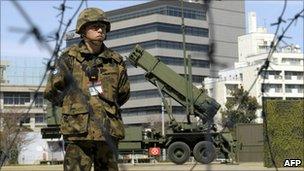Japan defence review warns of China's military might
- Published

The major strategic review will shape Japan's defence policy for the next 10 years
Japan has unveiled sweeping changes to its national defence polices, boosting its southern forces in response to neighbouring China's military rise.
It said Beijing's military build-up was of global concern. Japan shares a maritime border with China.
It will also strengthen its missile defences against the threat from a nuclear-armed North Korea.
China has responded saying it is a force for peace and development in Asia and threatens no-one.
China's Foreign Ministry said no country had the right to make irresponsible comments on China's development.
Flashpoints
The National Defence Programme Guideline has been approved by the cabinet and will shape Japan's defence policy for the next 10 years.
Japan is changing its defence policy in response to the shifting balance of power in Asia, analysts say.
Defences will be scaled down in the north, where they have been deployed since the Cold War to counter potential threats from the former Soviet Union.
The military focus will now be in the south of Japan, closer to China and remote flashpoint islands near Taiwan.
The guidelines say Japan is concerned by China's growing military spending, modernisation of its armed forces, and increased naval assertiveness in the East China and South China seas.
"These movements, coupled with the lack of transparency on China's military and security issues, the trend is a concern for the region and the international community," the new guidelines say.
Relations between Japan and China deteriorated sharply in September, after collisions between a Chinese trawler and Japanese patrol boats near a chain of disputed islands in the East China Sea.
North Korea concerns
The review paper outlines a shift in resources from the army to the air force and navy.
Japan's submarine fleet will be expanded from 16 to 22 and fighter jets upgraded, while the number of tanks will be cut by a third to 400.
North Korea's missile and nuclear programmes were also described as a "pressing and serious destabilising factor".
Pyongyang has fired missiles over Japan and staged nuclear tests in recent years.
Last month it unveiled a new uranium enrichment plant to US experts, and launched an artillery attack on a South Korean island, killing four people.
In response, Japan says more Patriot interceptor batteries will be deployed across the country, and the number of warships which can shoot down missiles will be increased from four to six.
It also plans to cut the number of soldiers by 1,000 to an official headcount of 154,000.
The US has an almost 50,000-strong troop presence in Japan. The paper called the Japan-US alliance "indispensable".
The review paper added that it was necessary to , including Okinawa.
Japan said it would "promote confidence and co-operation with China and Russia" while also developing ties with the EU and Nato.
Russian President Dmitry Medvedev sparked a diplomatic row with Japan earlier this year by visiting the Southern Kurils, which Japan calls the Northern Territories.
The islands, off the north coast of Japan's Hokkaido island, were seized by Soviet troops at the end of World War II, but Japan still regards them as part of its territory.
Japan has a pacifist constitution. Article Nine of the constitution, which was written under US post-war occupation in 1947, renounces the use of force by Japan in settling international disputes.
The 麻豆官网首页入口's Roland Buerk, in Tokyo, says the new strategic stance will be closely watched in Asia, where Japan's aggression has been neither forgotten nor forgiven.
- Published17 December 2010
- Published13 December 2010
- Published10 November 2014
- Published24 September 2010
- Published8 September 2010
- Published17 September 2010